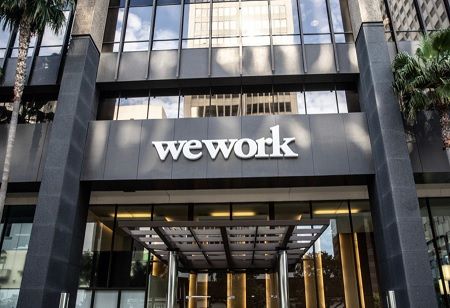
WeWork India Eyes Rs 1,000 Crore Boost from Top Investors

 WeWork India, the provider of flexible co-working spaces, is currently in discussions to raise Rs 1,000 crore in funding. The round is expected to be led by Enam's Vallabh Bhansali, A91 partners, Mithun Sacheti from CaratLane, and other investors, potentially valuing the company at Rs 3,000-4,000 crore. WeWork India stands out as a success story within the global company despite the challenges faced by WeWork overall. In the fiscal year 2023, WeWork India reported revenues of Rs 1,400 crore, with an EBITDA of Rs 250 crore and a net profit of approximately Rs 60 crore.
WeWork India, the provider of flexible co-working spaces, is currently in discussions to raise Rs 1,000 crore in funding. The round is expected to be led by Enam's Vallabh Bhansali, A91 partners, Mithun Sacheti from CaratLane, and other investors, potentially valuing the company at Rs 3,000-4,000 crore. WeWork India stands out as a success story within the global company despite the challenges faced by WeWork overall. In the fiscal year 2023, WeWork India reported revenues of Rs 1,400 crore, with an EBITDA of Rs 250 crore and a net profit of approximately Rs 60 crore.
The money will be used to buy back a stake from WeWork Global, which recently filed for bankruptcy, sources said. "The deal is however stuck with the Competition Commission of India (CCI) because such a large fund infusion in a market leader requires regulatory approval", sources said. The Embassy Group holds a controlling stake of 72.5 percent in WeWork India, while the remaining 27.5 percent is owned by 1 Ariel Way Limited, a UK-based entity and a subsidiary of WeWork Global.
Founded in 2017, the Embassy Group initially held full ownership of WeWork India. International involvement surfaced in 2020 when WeWork invested $100 million, securing approximately 27.5 percent equity in the Indian franchise. Following this, the global team adopted strategies from WeWork India's playbook.
“The global team needs continuous funding to grow their business. Ours is different; we are making money and do not need external capital. The global team looked at our model and how successful it was, then made it the benchmark for them to execute everywhere else in the world”, Virwani explained why his employees and building developers will escape unscathed.
He mentioned that after witnessing success in India, WeWork has adopted a comparable approach in other regions such as Israel, South Africa, Latin America, and China. It's understandable that WeWork Global is replicating the India model elsewhere. With approximately 90,000 desks in the country and an occupancy rate surpassing 80 percent, well exceeding the break-even point of 57-58 percent, according to Virwani, the company's growth trajectory was on course to achieve a 40 percent year-on-year increase.